Children with disabilities in Pakistan is the largest overlooked minority. There are no clear estimates of the number of children in Pakistan with disability. According to the World Health Organization (WHO), 15% of the world’s population has disabilities (around 1bn people). If we take the world average and apply this to Pakistan, the number of persons with disabilities could be approximately 27m, larger than the total resident population of Sweden, Austria and Switzerland combined. The number may be more owing to the poor health care facilities and poverty. The disability need not to be the physical disability but also encompasses the intellectual disabilities and the social-communication and other behavioral disorders. There is a huge need for the provision of support to the families raising these children.
Mission
Excellence in children’s rehabilitation and development through innovative clinical service, based on rehabilitation sciences.
Vision
All children and youth receiving services from the Paeds Development Unit will have the opportunity to discover and achieve their full potential to promote a family-centered approach towards the children with disabilities (physical, intellectual, social-emotional and language delays), in which families will actively participate in the assessment.
Values
We value and respect Children, Youth and their Families
- Family Centered/Family Driven Services
- Diversity, Inclusivity, Cultural Safety and Equity
- Advocacy for Children, Youth and Families
- Integrated, Collaborative Service Delivery
Service Excellence
- Innovation and Responsiveness
- Client Safety
- Efficiency, Effectiveness and Accountability
- Quality Improvement
- Research and Evidence Informed Practice
Staff and Volunteers
- Healthy and Respectful Workplace
- Engaged Staff and Volunteers
Team Members
Paediatric Neurologists
Paediatric neurologists deals with children with development delays and remain the centre point of the multidisciplinary rehabilitation team involved in the management of the children. Paediatric neurologist also diagnoses and manages the co-morbidities associated with the developmental delays. Read More...
Clinical Psychologist
A child psychologist is a mental health professional who uses psychological evaluations and various forms of therapy to help children and adolescents learn to better cope with life and relationship issues and mental health conditions. They can help treat mental, emotional, social and behavioral health conditions.
Occupational Therapists
Occupational Therapists help children develop the necessary physical, cognitive, sensory, fine motor development and visual motor skills so that they can perform daily task independently, needed for more functioning and socializing.
Speech Therapist
Speech Therapists or Paediatric Speech Language Pathologists (SLPs) deal with the treatment of communication disorders, voice disorders, and swallowing disorders in children. Paediatric Speech Language Pathologists (SLPs) help young patients overcome and manage these disorders, contributing to a higher quality of life for these children. Not every issue involves speech. Some patients need help with social communication difficulties, literacy impairments, or cognitive impairments, among others. A Paediatric SLP will also play an integral role in diagnosing and treating autism spectrum disorders.
Physical Therapists
Paediatric Physiotherapists are specialized in assessing, identifying, diagnosing and managing children with physical disabilities and motor delays. They make an important component of the team dealing with developmental delays, working towards achieving the realistic goals.
Packages
PDU Assessment Package
| Paeds Neurologist Assessment | Speech Therapist Assessment | Behavior Therapist Assessment | Occupational Therapist Assessment | Physical Therapist Assessment | Total Charges (PKR) | |
|---|---|---|---|---|---|---|
| PDU Assessment (02 Sessions) |
Included | Included | Included | Included | Included | 8500 |
PDU Therapy Packages
| Packages | Speech Therapy | Behavior Therapy | Occupational Therapy | Number of days | Total Cost (PKR) |
|---|---|---|---|---|---|
| PDU-1 | Included | Included | Included | 1 | 3,500 |
| PDU-2 | Included | Included | Included | 3 | 5,500 |
| PDU-3 | Included | Included | Included | 7 | 11,500 |
| PDU-4 | Included | Included | Included | 15 | 26,500 |
| PDU-5 | Included | Included | Included | 30 | 50,000 |
• The validation of 15 days and 30 days packages will be 3 months.
• Prior approval will be required for the Company panel patients.
Frequently Asked Questions
If you notice that your child is not developing or progressing when compared to children of his or her age; or when your child is growing slowly, sluggishly or seems to be lagging behind in growth – then you should consult a Paediatric neurologist.
The following are the developmental milestones for a child according to their age:
- Rolling at four months
- Sitting at six months
- Crawling at nine months
- Pulling to stand at ten months
- Walking at twelve months
- Movement difficulties – delay in the development of motor skills
- Cognitive skills developmental delay
- Social and emotional skills developmental delays
- Language or speaking skills delay
The most common causes of developmental delay include premature birth, Autism spectrum disorders, genetic disorders like Down’s syndrome, complications during pregnancy, chronic infections, Fragile X chromosome – an inherited type of cognitive impairment and foetal alcohol syndrome – which may result due to drinking excessive alcohol during pregnancy.
Prenatal infections environmental toxins exposure – mercury, lead and arsenic; head trauma; pregnancy-related complications; prenatal exposure to toxins – drugs, alcohol and smoking; nutritional deficiencies and maternal illnesses like autoimmune disorders, renal disease, high blood pressure and diabetes may increase the risk.
The potential causes for speech or language delays include trauma, genetic disorders, use of certain types of medicines, middle ear infections, hearing loss, speech disorder (dysarthria), child abuse, autism spectrum disorders and other learning disabilities. The cause may be unknown (idiopathic).
The potential causes for cognitive skills developmental delay include Autism spectrum disorders, Down syndrome, medical health issues before birth, premature birth, parenteral neglect and exposure to environmental toxins – such as mercury, arsenic and lead. Cognitive skills developmental delay cause learning difficulties.
Walking, movement and crawling difficulties come under gross motor skills developmental delays. Difficulties in using fingers to grasp pencil, spoon, pen and other objects come under fine motor skills developmental delays. Most children have problems with dexterity in using fingers and gripping objects.
Muscular disorders like myopathy, ataxia and other disorders like cerebral palsy and spina bifida cause these types of delays.
Autism is a neurodevelopmental condition which is usually diagnosed in the first three years of life. Generally, parents become concerned when their child has delays in speech development, limited social relatedness, and restricted interests and activities. The child may avoid direct eye contact and exhibit odd behaviors such as focusing on parts of objects (e.g. the spinning wheel of a toy car). There may be unusual motor movements such as hand flapping, self-stimulation or walking on toes.
Parents and relatives should be concerned about their infant or toddler if they notice any of the following developmental delays or behavioral problems and discuss concerns with their child’s paediatrician to obtain appropriate referrals for evaluation:
- Lack of or delay in development of spoken language
- Repetitive use of language and/or motor mannerisms (e.g., hand-flapping, twirling objects)
- Little or no eye contact
- Lack of interest in peer relationships
- Lack of spontaneous or make-believe play
- Persistent fixation on parts of objects
Faculty
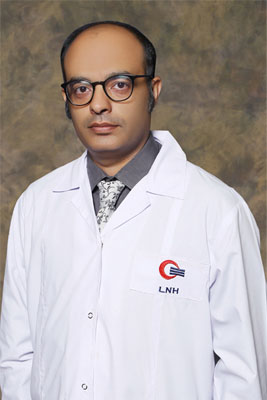
Dr. Raman Kumar
Unit Head of Paeds Development Unit Assistant Professor & Paediatric Neurologist
View Details
Therapists
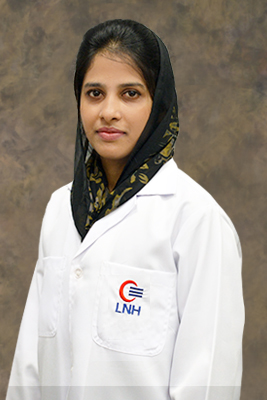
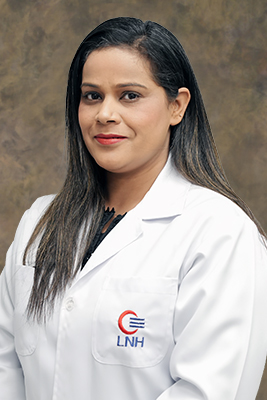
Ms. Nasreen Gulzar
Sr. Clinical Psychologist
Masters in Clinical Psychology /Registered Nurse, RBT, ADOS and ADIR Trainer
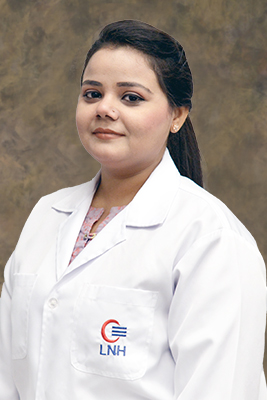
Ms. Nida Anjum
Occupational Therapist II
BSc (Occupational Therapy)
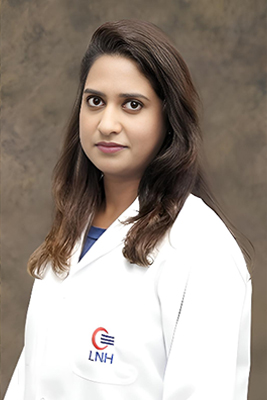
Ms. Nadia Aziz
Occupational Therapist II
B.Sc. (Occupational Therapy)
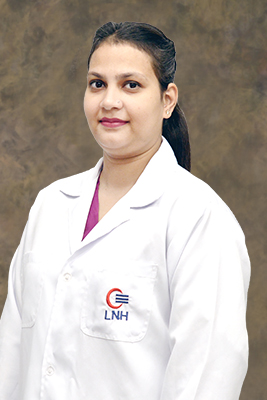
Ms. Samreen Qureshi
Occupational Therapist II
Doctor of Occupational Therapy, BS Occupational Therapy
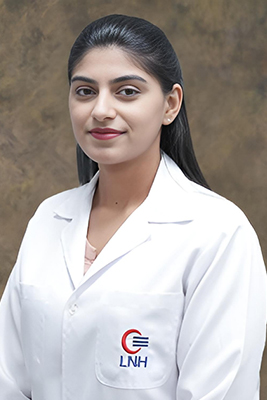
Ms. Anjiya Tharani
Physiotherapist I / Lecturer I
Doctor of Physical Therapy
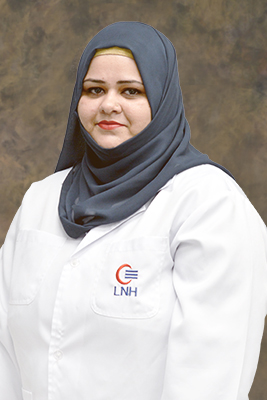
Ms. Syeda Aniqa Zaidi
Speech & Language Therapist
MA Audiology & Speech Language Pathology
Contact
Please call us on
021-34412302.
Email
Paeds.Neurology@lnh.edu.pk.
Multidisciplinary evaluation of the children
Friday & Saturday 1:30 pm - 4:30 pm.
Report discussions
Friday & Saturday 1:30 pm - 4:30 pm.
Location
Senior Citizen Primary Care Unit.

